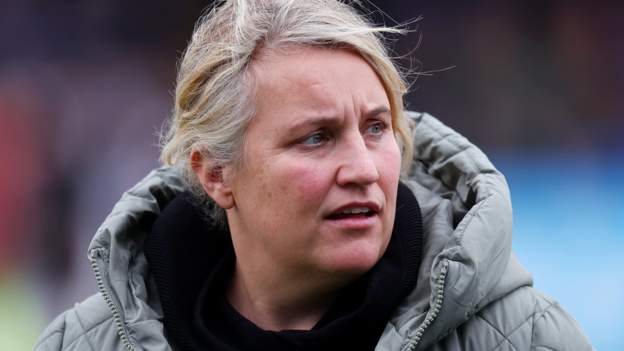Women’s football in England should be “open” to the idea of a closed league, says Chelsea manager Emma Hayes.
The Women’s Super League in England, as with other European leagues, operates on a traditional promotion and relegation system.
In contrast, the National Women’s Soccer League in the United States is a closed league featuring the same teams, or franchises, each season.
“I’ve worked in that in the United States,” said Hayes.
The 46-year-old – who previously managed the Chicago Red Stars in the NWSL – added: “I like the idea of relegation and promotion from a traditional perspective, but it doesn’t mean we should be hamstrung by it. We should be open about it.
“I’ve seen the successes of promoting franchise-type leagues and the consistency that that can then place in running that. Look at the WNBA [Women’s National Basketball Association] as a great example.
“We should be open to everything, and everything shouldn’t always be compared just because it’s traditional or just because of the men’s game.
“I think we should have an openness about reflecting on the pluses and minuses.”
Hayes is a contributor to a major national review of women’s football which will examine issues affecting the game at elite and grassroots levels in England.
The findings of the review, chaired by former England midfielder Karen Carney, are expected to be published this summer.
Hayes also believes the “scandalous” prize money on offer in the women’s game, compared to that in the men’s, needs to be addressed.
“On the pitch the product is the best in the world. The best players want to be here,” Hayes said.
“Off the pitch in terms of the standards around the game, it’s not equal.”
The winners of this season’s men’s FA Cup will win £2m, while the women’s champions will pocket £100,000.
The women’s FA Cup total prize money fund is up tenfold on last season.
“You’ve got prize money, which is scandalous, it’s outrageous,” Hayes added.
“Across the women’s game, that prize money is going to have an impact all the way down the food chain.
“And then on top of that you’ve got broadcasting which, when the next set of broadcasting rights are up, I think it’s going to be a significant moment for the women’s game.
“Prize money will help clubs to have bigger budgets to be able to create that support in and around them.”




